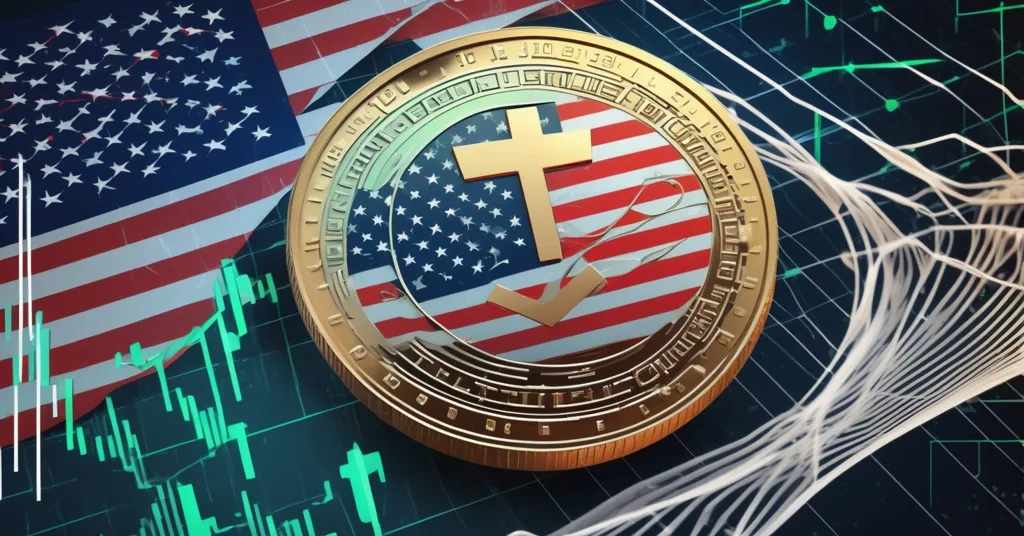Tether Explores U.S.-Only Stablecoin Amid Trump’s Crypto-Friendly Policies

Tether Considers U.S.-Only Stablecoin Amid Trump’s Pro-Crypto Policies
Tether, the leading issuer of the world’s most traded stablecoin, is actively considering launching a U.S.-only version of its token, driven by the potential for favorable regulations under the Trump administration.
- Tether explores U.S.-only stablecoin leveraging Trump’s crypto-friendly policies
- Engages with U.S. regulators to shape stablecoin frameworks
- Prioritizes transparency through Big Four audits and cooperation with law enforcement
Tether’s CEO, Paolo Ardoino, has confirmed the company’s interest in introducing a U.S.-only stablecoin if new regulations make it competitive. “The administration views stablecoins as a crucial financial instrument for the U.S. economy,” Ardoino stated, emphasizing the potential for stablecoins to become a pivotal part of the financial landscape. This move is not just about chasing the American dream; it’s a strategic maneuver to navigate the complex regulatory environment while aiming to cement Tether’s position in the crypto economy.
Stablecoins, like Tether’s USDT, are cryptocurrencies designed to maintain a stable value, often pegged to a fiat currency like the U.S. dollar. They serve as a bridge between traditional finance and the volatile crypto market, facilitating transactions and providing stability.
Tether’s U.S. Ambitions
Tether’s consideration of a U.S.-only stablecoin is a direct response to the Trump administration’s pro-crypto stance. Trump’s mission to position the U.S. as “the crypto capital of the planet” has led to a significant shift in the regulatory landscape, with enforcement actions against crypto firms paused or ended. This environment has sparked discussions about the STABLE Act, a legislative proposal aimed at regulating stablecoins, with Tether actively engaging with lawmakers like Representatives Bryan Steil and French Hill.
The potential U.S.-only stablecoin could significantly impact the domestic crypto market, fostering increased competition and innovation. It could provide U.S. consumers with a stable and reliable means of participating in the crypto economy, aligning with Trump’s vision of making the U.S. a leader in the crypto space.
Navigating Regulatory Waters
Tether has faced scrutiny over allegations of criminal ties, but Ardoino insists the company is playing by the book, cooperating with the FBI, Secret Service, and Department of Justice. This cooperation is part of Tether’s broader effort to shake off past controversies and demonstrate its commitment to regulatory compliance.
The Trump administration’s policies are seen as a counter to perceived efforts like Operation Chokepoint 2.0, which aimed to restrict crypto companies’ access to financial services. By engaging with U.S. regulators on stablecoin frameworks, Tether aims to benefit from a regulatory environment that encourages innovation and competition.
Federal Reserve Chair Jerome Powell has also voiced support for a regulatory framework for stablecoins, highlighting the need for oversight to protect consumers and maintain financial stability. “The Federal Reserve supports the creation of a regulatory framework for stablecoins,” Powell affirmed, indicating a consensus among financial regulators on the importance of stablecoin regulation.
The Path to Transparency
With over $144 billion in circulation and a reported $13 billion in unaudited profits last year from U.S. Treasury bill investments, Tether is a major player in the crypto space. These profits, while impressive, have raised eyebrows, prompting Tether to take steps toward transparency.
The company is in talks with one of the Big Four accounting firms for a full audit of its reserves, highlighting transparency as a top priority. Tether’s hiring of Simon McWilliams as CFO to steer the company toward this audit underscores their commitment to rebuilding trust and expanding market presence.
Headquartered in El Salvador and managing its reserves through Cantor Fitzgerald, Tether’s strategic move to consider a U.S.-only stablecoin is about leveraging the Trump administration’s vision to reshape the crypto landscape. However, the allegations of criminal activity, while denied, continue to loom over Tether’s past, influencing regulators and users alike.
Bitcoin Maximalist Perspective
Bitcoin maximalists might view Tether’s move as a necessary evil or a distraction from Bitcoin’s core principles. They argue that stablecoins, while useful for liquidity and transactions, divert attention from Bitcoin’s potential as a decentralized digital currency. However, even the most ardent Bitcoin supporters recognize that stablecoins like Tether play a crucial role in the broader crypto ecosystem, facilitating transactions and enhancing market stability.
Future Outlook
The potential for a U.S.-only stablecoin could be a game-changer, but it’s also a testament to the delicate balance between innovation and regulation. Tether’s journey from the fringes to the heart of the financial system is a narrative of resilience, ambition, and the relentless pursuit of legitimacy in a space that thrives on disruption.
Tether’s strategic move could either be a masterstroke in regulatory navigation or a risky bet that could backfire spectacularly. The success of this endeavor will depend on the company’s ability to navigate regulatory challenges, enhance transparency, and maintain its position as a leader in the stablecoin market.
Key Takeaways and Questions
- What is Tether considering doing if favorable regulations are introduced in the U.S.?
Tether is contemplating launching a U.S.-only version of its stablecoin to capitalize on a potentially more competitive landscape for domestic issuers. - How does the Trump administration view stablecoins?
The Trump administration views stablecoins as a crucial financial instrument for the U.S. economy and aims to make the U.S. the “crypto capital of the planet.” - What actions has Tether taken to address past scrutiny and allegations?
Tether is proactively cooperating with U.S. law enforcement agencies and engaging with lawmakers to shape regulations. The company is also considering full audits by Big Four accounting firms to enhance transparency. - How has the regulatory environment changed under Trump’s administration?
The regulatory environment has shifted to be more welcoming, with enforcement actions against crypto firms paused or ended, and the administration seeking new rules for stablecoins by August. - What is the current status of Tether’s engagement with the U.S. government and regulators?
Tether is actively engaging with U.S. regulators, law enforcement, and lawmakers to discuss stablecoin frameworks and contribute to regulatory bills such as the STABLE Act. - What role does the Federal Reserve play in stablecoin regulation?
The Federal Reserve, led by Jerome Powell, supports the development of a regulatory framework for stablecoins to protect consumers and savers.



